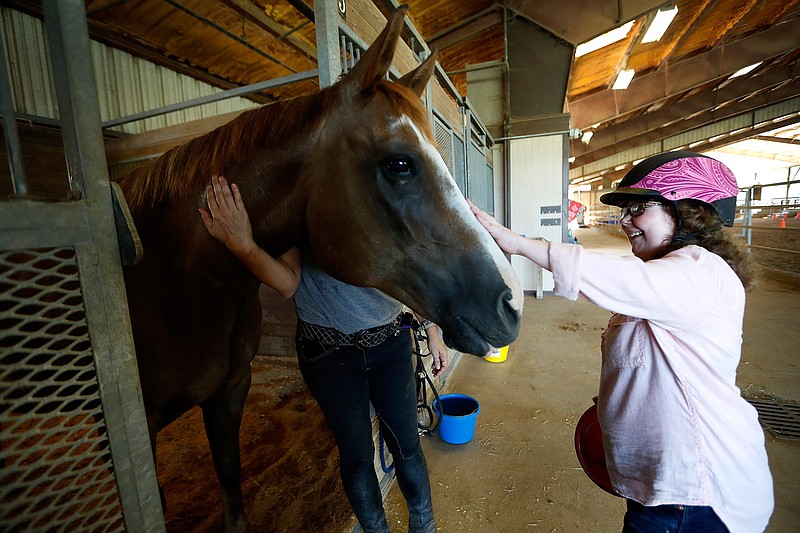RICHMOND, Texas-Lauren Hall sits atop a brown and white speckled horse, Santana.
The Houston Chronicle reports the young woman's back is straight and her grin is wide. Her cheetah print boots, lined with pink, are flopped on either side of the horse's saddle.
"It's Lauren's favorite day of the week," said her mother, Helen Hall.
Hall is a much different rider than when she first got on the saddle four years ago. The 28-year-old was born with a rare genetic condition that affects almost every aspect of her daily life, and she can get anxious at times.
After four years of horseback riding at the SIRE Therapeutic Horsemanship's Richmond facility, though, Hall has become a confident and cheerful rider. Instructors think the changes speak to the powerful connection that can build between horses and riders.
"Horses-they target everything. They target physical difficulties, but they also target mental," said Helen Evans, site manager at SIRE. "We can't really say why, but they just do it. It's a gift. They tune into what nothing else can give them. All animals have a very good way with dealing with emotions, but horses seem to shine through it all."
SIRE, a nonprofit charity, has been using horse therapy to help those with special needs and disabilities since 1983, when it started with just two horses and had only five clients. The program each week now serves more than 300 riders with a wide range of physical and mental issues across the Houston area.
Hall remembers feeling afraid during her first lesson riding at SIRE. Dismounting from her horse, Sugar, was initially terrifying for Hall.
"It was a huge obstacle for her to overcome because it looked like it was really far down from where she was sitting," said Toni Conner, who teaches Hall and is also the Richmond site's lead volunteer coordinator. The program also has locations in Hockley and Spring.
The young woman has been through a lot because of her genetic condition, pseudohypoparathyroidism, including open heart surgery and scoliosis. She also has attention deficit disorder and IDD, a developmental disability. She reads on a sixth-grade level and her math skills are in the same range as a second-grader's.
Her mother said Hall's condition causes her to have a child-like innocence and vulnerability, as she still plays with her dolls and loves the Disney animated movie "Frozen."
Conner said staffers took Hall's fear step by step, trying to change her perspective of the dismount from something that frightened her to one of her favorite activities. It's a similar practice when they're dealing with riders of all ages who are affected by various kinds of disabilities-breaking down something into an achievable goal.
"I know this is scary for you, but instead of saying this is the part you hate, I want you to say, 'This is the part you love,'" Conner remembers telling Hall.
Instructors say it's the little victories that make riders feel they're capable of more.
"Everything we do in the arena, we want to connect to their daily living," said Joe Wappelhorst, executive director for SIRE. "How can these goals connect to making your life better?"
After riding at the facility for two semesters, Hall began to enjoy the dismount and fell in love with her horse, Sugar, now retired.
Hall's face brightens when she talks about Sugar and asks Conner if she can visit her after she finishes riding Santana during the lesson.
"Oh, I love her so much," said a beaming Lauren.
Besides rehabilitating people, the team at the Richmond location also helped nurse back to health a horse that was rescued and brought to the stable shortly after Hurricane Harvey struck a year ago.
On a clear August day, Ernie's brown mane shines and his frame is sturdy-much different from the malnourished horse that Evans first started taking care of months prior.
Back then, he had sores on his legs and no vaccinations.
"He was very neglected," Evans said of the horse. "He had six years with no interaction. He was shell-shocked and very curious."
After receiving a call from a woman during the storm who said she had three horses stranded that she couldn't reach, the program took in the 15-year-old sorrel-colored American quarter horse. The two other horses were rescued elsewhere.
The woman had been in and out of the hospital, so she was unable to properly take care of the horses.
Now Ernie neighs when visitors walk by and services riders throughout the program.
Underneath the barn's awning, Hall carefully glides around each bright orange cone as two instructors walk near her.
Her horse that day, Santana, struts confidently in the brown dirt with Hall astride the animal-"like a queen," her mother comments.
"When she competes at the competitions, she doesn't even have a lead," said Helen.
"I never in a million years would've thought that she would come so far just in her confidence, in her balance, in her trust."
Conner has seen other riders improve. Some riders who might not normally be as communicative, such as those with autism, may talk more after spending time on the horse. For others, it's a moment of freedom after being wheelchair bound all day.
"These kids are just so innocent and they're so open," said Helen. "The horses-they sense that. The horses are so patient and just willing for the kids to build up that trust between the horse and the person."


